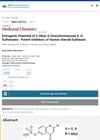Sulfatase Inhibitors: A Patent Review
November 2012
in “
Expert Opinion on Therapeutic Patents
”

TLDR The document concludes that research on sulfatase inhibitors should continue due to their potential in treating various diseases, despite some clinical trial failures.
The document from 2012 reviews the development of sulfatase inhibitors, with a focus on steroid sulfatase (STS) inhibitors, for the treatment of hormone-dependent diseases such as breast cancer and endometriosis. It discusses the clinical trials of STS inhibitors like STX64 and PGL2001, the development of non-estrogenic steroidal sulfamates to avoid tumor growth stimulation, and the potential of these inhibitors in treating skin disorders, fertility issues, and memory enhancement. The review also covers the dual-acting compounds that inhibit STS and other cancer-related targets, the concept of reversible STS inhibition, and the use of pharmacological chaperones for lysosomal storage disorders. Despite some clinical trial failures, the document suggests continued research into STS inhibitors and their broader therapeutic applications, including their potential role in estrogen-ablative cancer therapy and treatment of androgen-stimulated diseases. The document concludes with the need for more drug-like leads for lysosomal sulfatase deficiencies and acknowledges funding support from the Australian Research Council.




